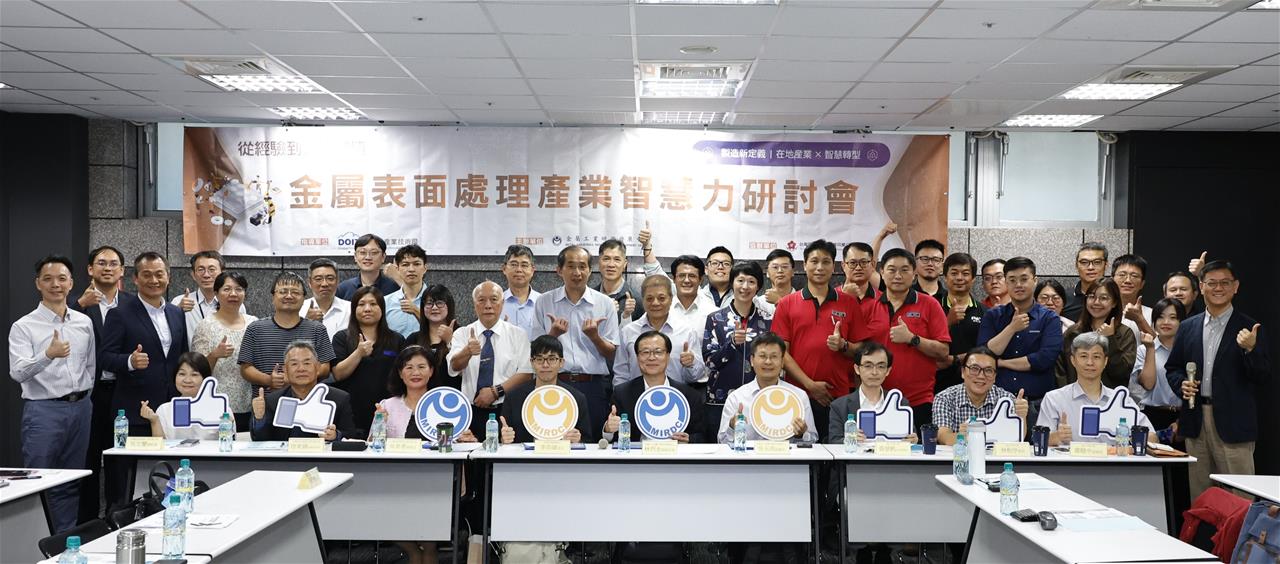
To assist the traditional surface treatment industry in advancing towards smart manufacturing and low-carbon transformation, the Metal Industries Research and Development Centre (MIRDC) held the Smart Power Seminar for the Metal Surface Treatment Industry on November 6, 2025, inviting experts from industry, government, and academia to exchange the latest technological achievements. The bustling event was hosted by MIRDC Vice President Lieh-Chuan Lin, with the participation of I-Wei Li, Technical Specialist from the Department of Industrial Technology (DoIT), Ministry of Economic Affairs (MOEA); Mei-Hsiang Wu, Chairperson of the Taiwan Surface Finishing Association; and representatives from various small and medium-sized enterprises (SMEs).
There are approximately 1,599 metal surface treatment manufacturers in Taiwan, with the industry structure primarily consisting of SMEs, mainly distributed in New Taipei, Changhua, and Taichung. Surface treatment is a crucial link in enhancing product value, covering key characteristics such as appearance, wear resistance, and corrosion resistance. The project establishes multiple smart tools that SMEs can immediately replicate and apply, including the Smart Manufacturing Management System, AI Interactive Reports, Low-Carbon Process Technology, and the Trans Standard Addition Method for rapid detection of wastewater, which combines academic research outcomes to lower the threshold for smart transformation by businesses.
MIRDC Chairperson Chia-Ju Liu remarked that surface treatment processes have long relied on the judgment of experienced craftsmen to maintain process stability, making knowledge transfer challenging. In the face of the dual challenges of AI and carbon management, MIRDC combines policy resources and research outcomes to continue promoting DoIT's Academic-Industry Local Industry Innovation Value-Addition Program. The deployment of smart and low-carbon technologies aids traditional surface treatment businesses in attaining high-value transformation. MIRDC Vice President Lieh-Chuan Lin stated that MIRDC helps businesses to deploy smart monitoring and real-time AI analysis mechanisms, and collaborates with Professor Ching-Fan Huang's research team from the Department of Chemistry, National Chung Hsing University (NCHU), allowing SMEs to easily adopt smart tools. He especially thanked Deputy Director General Yung-Cheng Wu of the Industrial Upgrading Service Department, who leads Analyst Po-Hsun Chou and Engineers I-Ming Lin and Jang-Kai Chang, among others, in a team that strives for industry transformation.
Chairperson Mei-Hsiang Wu of the Taiwan Surface Finishing Association pointed out that surface treatment is the "last mile" for various sectors, relating to the final value of products. MIRDC's long-term support and technical mentorship have enabled businesses to constantly advance towards AI-powered smart and low-carbon manufacturing in the journey from first-generation to second-generation leadership, injecting new momentum into industrial transformation and strengthening competitiveness.
First, Analyst Po-Hsun Chou shared industry trends. He noted that the global metal surface treatment market continues to expand, with a technological focus on high efficiency, innovation, and green sustainability. In 2024, the domestic surface treatment output value is estimated to have reached approximately NT$220.6 billion, up 4.4% from the previous year. Although Taiwan's surface treatment industry is primarily driven by domestic demand, it has become the "quality gatekeeper" for related industries such as semiconductors, electric vehicles, aerospace, construction, and machinery, leveraging its advantages in precision manufacturing and customization. Related industries comprise automotive parts, optoelectronic devices, metal structures, metal fasteners, and machine tools, with an overall associated output of approximately NT$12.8 trillion, playing a significant role in Taiwan's manufacturing system. In the future, support from government R&D resources, digital tools, and academic research and innovation will speed up the industry's transition towards AI and green processes, enhancing export potential and sustainable competitiveness.
Next, MIRDC Engineer I-Ming Lin presented the Smart Manufacturing System for the Surface Treatment Industry, which can achieve precise dosing and stable plating baths through smart situational analysis, reducing raw material waste and improving energy efficiency. The system also integrates X-ray detection of film thickness and real-time data integration, where AI serves to accurately predict processing film thickness, assisting businesses to attain a stable quality while lowering energy consumption.
The seminar especially introduced the total ion detection technology developed by Professor Ching-Fan Huang's team from the Department of Chemistry, NCHU: the Trans Standard Addition Method. This method enables rapid detection without the need to dilute samples, particularly suitable for in-house rapid screening applications. Although the data accuracy falls slightly lower compared to traditional laboratory methods, it can help businesses quickly grasp changes in wastewater, improving management efficiency and responsiveness. Attending manufacturers experienced the Handheld Conductivity Detection Technology developed by MIRDC, capable of determining whether wastewater deviates from a factory's daily compliance standards using just a sample drop. Many businesses expressed amazement at the simple operations that yielded immediate data, showing great potential for application by SMEs.
MIRDC Engineer Jang-Kai Chang concluded the event presenting the Process Traceability Management System for the Surface Treatment Industry. It incorporates AI agent functionality that allows users to ask questions in natural language, then translates these into programming commands for data queries and report generation by a large language model. Attendees experienced interactive report operations in real time using handheld devices, witnessing the convenience and potential of AI in the manufacturing field.
As the global supply chain values ESG and carbon tax systems, MIRDC assists domestic enterprises in staying ahead of the curve and bolstering global competitiveness. MIRDC will continue to assemble resources from industry and academia, public associations, and local industries to build an enduring smart manufacturing ecosystem. This will allow Taiwan's surface treatment industry to march towards a high-value new horizon on the foundation of smart technology, as to pursue sustainability.